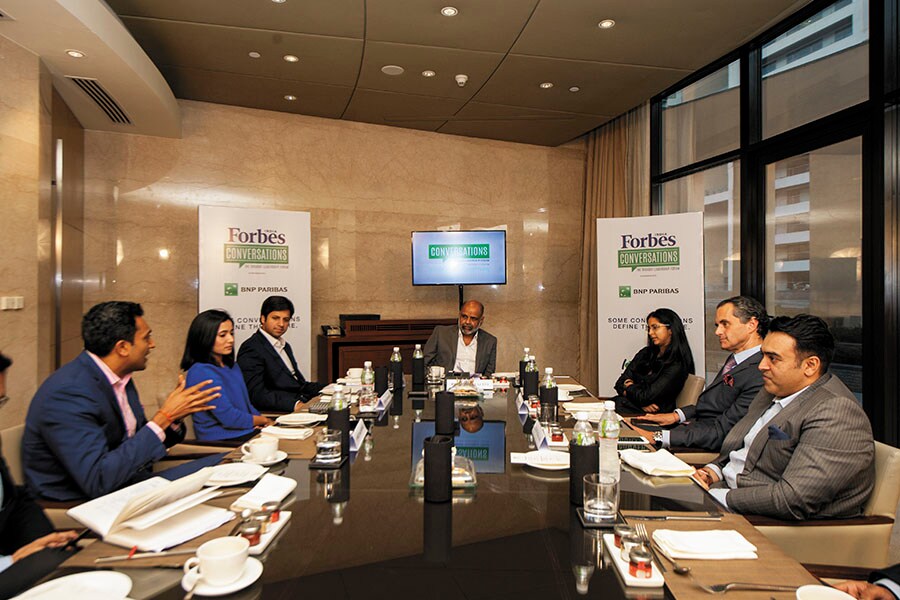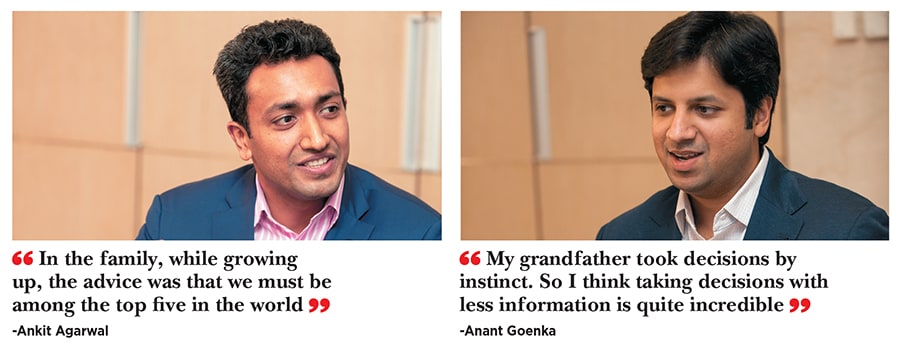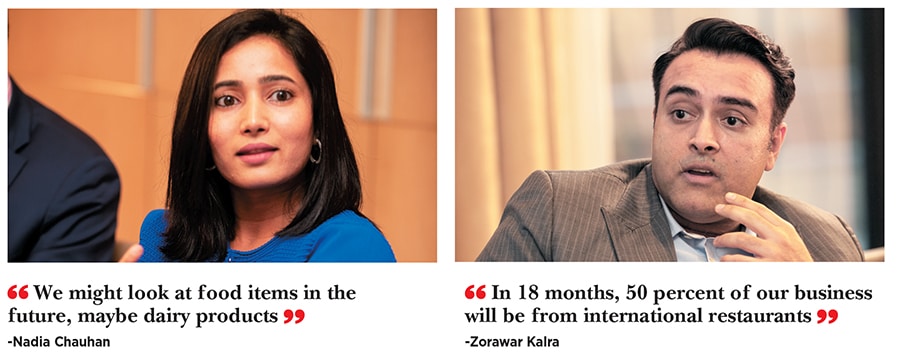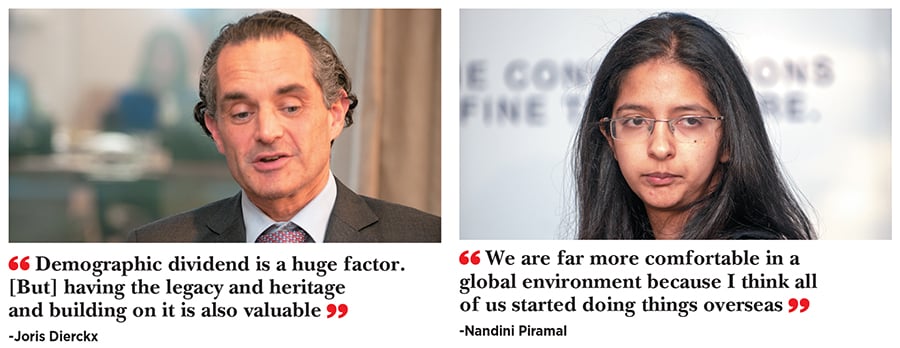
Making of a leader: Delving into promising minds
Forbes India decodes how young scions are steering old and new businesses
 (Clockwise from left) Ankit Agarwal, director at Sterlite Technologies, Nadia Chauhan, joint MD of Parle Agro, Anant Goenka, managing director of Ceat, Forbes India Editor Brian Carvalho, Nandini Piramal, executive director at Piramal Enterprises, Joris Dierckx, CEO & Country Head , BNP Paribas India, and Zorawar Kalra, food entrepreneur and founder-MD of Massive Restaurants
(Clockwise from left) Ankit Agarwal, director at Sterlite Technologies, Nadia Chauhan, joint MD of Parle Agro, Anant Goenka, managing director of Ceat, Forbes India Editor Brian Carvalho, Nandini Piramal, executive director at Piramal Enterprises, Joris Dierckx, CEO & Country Head , BNP Paribas India, and Zorawar Kalra, food entrepreneur and founder-MD of Massive Restaurants
Forbes India, in association with BNP Paribas India, held the Thought Leadership Series on November 30, 2017, bringing together a host of young and successful business leaders to share their insights on entrepreneurship. As part of a discussion titled ‘The Rise of GenNext Business Leaders in India’, Forbes India Editor Brian Carvalho spoke with Anant Goenka, managing director of Ceat Ltd, Nandini Piramal, executive director at Piramal Enterprises, Nadia Chauhan, joint MD of Parle Agro, Zorawar Kalra, food entrepreneur and founder-MD of Massive Restaurants, Ankit Agarwal, director at Sterlite Technologies, and Joris Dierckx, CEO & Country Head , BNP Paribas India, about how these young business leaders are changing the professional landscape. Excerpts:
Brian Carvalho: India’s business environment is all about opportunity, but there is also a lot of competition, regulation, disruption and uncertainty. What are the growth opportunities and is there a positive climate for new ventures, diversifications and even inorganic growth? Anant, you are in a business that’s been growing over the years and you’ve added new life to it. How do you see the road ahead from here?
Anant Goenka: As an industry, we are at an exciting time. We have an amazing demographic dividend in the company. That’s going to give us a competitive advantage for the next 20-25 years. And GST is an incredible move despite what everyone says.
Carvalho: Nadia, you are also in a business that probably had a growth phase in the 1990s when the reforms began. How has your business transformed in the last two decades or so?
Nadia Chauhan: Over the last 13 years, we’ve grown by about 800 percent, from being a ₹250 crore to almost a ₹4,000 crore company. Consumers today are open to trying out new things and that’s a big deal in a category like ours because 95 percent is still dominated by a preference towards mango. The challenge is to bring in new products and to be able to develop them. It takes a lot of time and huge investments because there is such a dominant preference. The other big factor in India is seasonality. There is a mindset that you don’t drink anything cold after summer or when it’s raining or if it’s cold outside, unlike a lot of other parts of the world where you see people having ice cream even in winter.

Carvalho: Zorawar, you would largely represent the consumer side of the business. So, for you, it’s probably a phenomenal change if one looks at what your father built…
Zorawar Kalra: My father’s lifestyle was kind of living out of hotels and making great brands for the hotels. He built brands like Bukhara, Dum Pukht and The Great Kabab Factory but he didn’t own any of them. That was a big problem for me and I thought I needed to do something. The sole reason for me to go overseas was to be able to think like a corporatised company because even now, even though our industry is almost $17 billion, over half of it is unorganised. A change in mindset about how we perceive the industry was required. We have seen the impact of demonetisation and then there was a liquor ban. GST is not a negative thing. But now, for the restaurant industry alone, they removed the income tax credit, which makes all my expenses go up by around 10 to 12 percent. The business becomes unviable entirely. How do I mitigate that? By increasing prices in a competitive environment? So, for us, the business environment is beyond our control. This has been the toughest year for us. That’s why my strategy shifted around March 2016 to go overseas significantly. In the next 18 months, 50 percent of our business will be from international restaurants. We are opening in about eight countries in the Middle East and in London and Dubai. It’s a situation that needs some kind of lobbying on our part.
Carvalho: Nandini, you have chosen to lead a business that was close to your parents, something that they grew for a long time in the ‘90s and 2000s.
Nandini Piramal: I do a lot of things and not just pharma. I also lead risks and HR. We’re doing a lot of things, which require a lot more complexities, like 70 percent of our revenues are forex dominated, at least in pharma. We also have an OTC business.
Carvalho: Ankit, commodities are something that Sterlite is big on and probably the cables business was one of the earliest, started by your uncle. It has come a long way since then from copper to optic fibre, and now there is 4G and 5G and beyond…
Ankit Agarwal: When we tried to get into optic fibre, everyone thought we were crazy because no one was doing it in India then. We have fibre optic technology that only five companies in the world have. We have technologies such that we go into China. In the family, while growing up, the advice was that we must be among the top five in the world, and second, if everyone has to die, we must die last. The biggest transformation that happened in India was to take optic fibre to every village. Fortunately, we have a forward-looking government with Digital India, so there is a ₹10,000 crore project currently to connect every village on optic fibre. We are getting into deployment of the network itself. Our toughest challenge is to bring network connectivity across the country. We decided to take up Jammu & Kashmir. It’s probably the toughest terrain in the world to deploy fibre optics due to terrain, weather, security concerns, lack of manpower and few working hours and in that we were doing a 10,000-kilometre network.

Carvalho: Joris, how do you see the business landscape changing and more particularly the business family landscape, which, in India, is pretty sizeable?
Joris Dierckx: The business environment has changed enormously. A lot of issues that were constraining economic growth have been resolved by private sector investments and private sector initiatives. And that has given a lot of dynamism to the economy that was not there 20 years ago.
Carvalho: What was it like growing up in a business family? Did you feel like you want to be a part of this?
Goenka: It was pretty clear early on that I would do that. While we have a few different businesses in transmission and tyres, for me, Ceat was always something that I considered to be a part of the family business more just because it was more consumer-centric and you could touch and feel a tyre.
Piramal: I joined McKinsey after undergrad before business school; we all had choices and we all decided that this was better for us.
Chauhan:I am a big foodie, so I was my dad’s favourite guinea pig. Growing up, I tried the various products that he could develop. I always knew that this is where I’d be in my holidays or weekends, time after school would pretty much always be at office. I had a space of my own, in my dad’s cabin.
Agarwal: I don’t know anything else apart from this. I am just lucky that I get to connect to every part of the country.
Kalra: Like Ankit, I didn’t want to be in anything else. My father was a professional consultant, but he wasn’t in the business of restaurants. So mine is a logical extension of what he used to do. I realised that if we wanted to build something of value for ourselves, it was important to own the intellectual property.
Carvalho: We in the media assume that the founder of a business typically has a lot of fire in his belly that waters down as we come to the second and third generation. How true is that? How would you compare your initiation into the business as against your grandfather starting businesses on his own?
Goenka: My grandfather started with a spate of acquisitions and was able to grow it fast. So, I had to establish credibility first, starting off at a junior position. I joined Ceat as a territory leader (sales) for the Vashi region [in Navi Mumbai], moved to looking at half of Maharashtra sales and then over 7-8 years grew into the role that I am in now.
Piramal: I worked in the factory doing operational excellence, so I know far more about supply chains than I should in a way. We are far more comfortable in a global environment because I think all of us started doing things overseas.
Chauhan: It’s been a 30-year journey for the brand. In 1985, when Frooti was launched, it was the first tetra pack product in India. It was about teaching consumers how to use the pack and consume out of it. A few years ago, our vision was extremely aggressive and we wanted to get back to the No 1 spot, which we had lost after we sold a lot of our brands to Coca-Cola. We needed to breathe life into the brand and compete with our rivals. Today we are the No 2 brand in the country. In the next 30 years, we could see segmentation in the beverage category, as seen in fruit-based beverages. We’ve just launched Frooti Fizz, which is an extension of an existing category.

Carvalho: I read about this richest family in Philippines… the grandson started something totally different, a self-service storage business. Was that ever a temptation, to start something completely new?
Goenka: Rarely, not so much, but once in a while when it has, I’ve always thought of it as being under the family umbrella.
Chauhan:It could be anything, but the largest part of our portfolio is fruit-based. We might look at food items in the future, maybe dairy products, but right now, the opportunity in what we are doing is so immense that we are just enjoying the growth.
Carvalho: Joris, how do you see the road ahead when you see how young leaders like these think… does it make you optimistic of being in India for another 20 years?
Dierckx: Demographic dividend and technology disruption are huge factors. That being said, I think having the legacy and heritage and building on it is also valuable.
Carvalho: What’s the inspiration and the advice that you remember from your father or anybody in the family?
Kalra:I was told by my father early on to figure out something that I wanted to do for free and then figure out a way to make money from it. The second thing he said was whenever you try to do something, try to be the best that you can be; don’t play for second place.
Piramal: Do what you love; we have to enjoy getting up every day and going to work.
Chauhan: He [Prakash Chauhan] always spoke about being passionate about whatever you are doing.
Agarwal: For us, it has been what is the bigger purpose and its impact on society. We are a fairly mid-sized company, but we are getting phenomenal talent because we are able to connect people with the bigger purpose we are doing through our company.
Goenka: The learning is to respect people and the second is the way
my grandfather took decisions by instinct. We spent too much time analysing an acquisition, but he said he would have just decided a month before us and closed it. So I think just taking decisions with less information is something that has been quite incredible.
(This story appears in the 30 November, -0001 issue of Forbes India. To visit our Archives, click here.)





